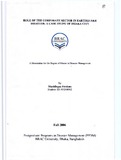| dc.contributor.advisor | Maniruzzaman, K M | |
| dc.contributor.author | Ferdous, Mushfequa | |
| dc.date.accessioned | 2010-09-23T10:00:11Z | |
| dc.date.available | 2010-09-23T10:00:11Z | |
| dc.date.copyright | 2006 | |
| dc.date.issued | 2006-09 | |
| dc.identifier.other | ID 05268002 | |
| dc.identifier.uri | http://hdl.handle.net/10361/221 | |
| dc.description | This dissertation is submitted in partial fulfillment of the requirements for the degree of Master in Disaster Management, 2006. | |
| dc.description | Cataloged from PDF version of Dissertation. | |
| dc.description | Includes bibliographical references (page 52). | |
| dc.description.abstract | Natural hazards are inevitable phenomenon all around the world and when the hazards go beyond human capabilities to cope with, and then it turns into disaster. In the past the number of disasters and their impact on human and economic development worldwide has shown a steady increase. Urban areas in the developing country are more vulnerable due to dense population, unplanned urbanization, poverty and centralization of economic assets. Dhaka the capital of Bangladesh is situated in an earthquake prone area for its geological settings, moreover the unplanned expansion on filling lands magnifies the vulnerability. Bangladesh being an agrarian country, the industrial contribution is significant in the national economy. The corporate sector is an integral part of the community and draws its sustenance from it, and consequently cannot remain isolated from disaster reduction initiatives. The study finds the corporate sector's involvement in risk reduction activities especially on earthquake disaster mitigation. The various private sectors were selected on the basis of their contribution to the national economy. Various issues are to be integrated on corporate disaster preparedness and management to advocate materializing it as the corporate social responsibility. There is a Standing Order in the Government Policy but the incorporation of the business sector is yet to be addressed. It is not possible for the government alone to combat with the disasters for lack of manpower, logistic support, financial assistance etc. The role and responsibilities of the corporate sector identified should be institutionalized to develop a comprehensive corporate contingency planning against disasters. So a comprehensive earthquake preparedness plan can be possible by building partnership with business community and government along with the NGOs. | en_US |
| dc.description.statementofresponsibility | Mushfequa Ferdous | |
| dc.format.extent | 60 pages | |
| dc.language.iso | en | en_US |
| dc.publisher | Department of Architecture, BRAC University | en_US |
| dc.rights | BRAC University dissertation are protected by copyright. They may be viewed from this source for any purpose, but reproduction or distribution in any format is prohibited without written permission. | |
| dc.subject | Disaster management | |
| dc.subject | Earthquake disaster | |
| dc.subject | Corporate social responsibility | |
| dc.title | Role of the corporate sector in earthquake disaster: a case study of Dhaka city | en_US |
| dc.type | Dissertation | en_US |
| dc.contributor.department | Department of Architecture, BRAC University | |
| dc.description.degree | M. Disaster Management | |

